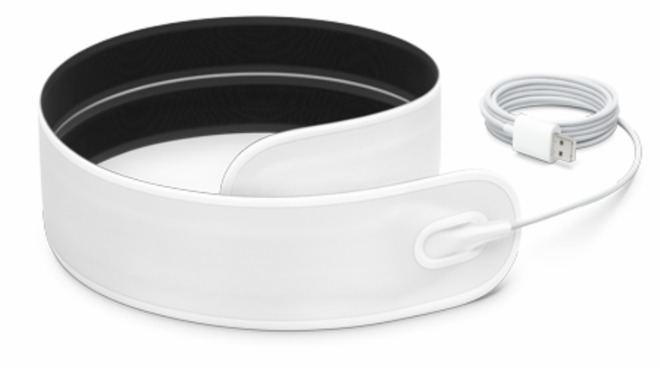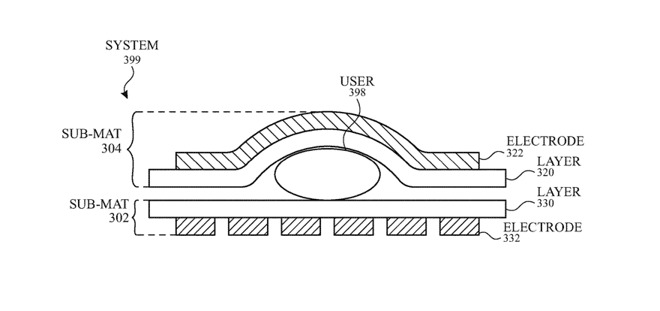Apple's sleep and health tracking ambitions extend to blankets and mattresses
Following many suggestions that Apple is bringing sleep tracking to the Apple Watch, the company appears poised to further delve into its Beddit purchase and develop bedding and blankets to monitor vital signs.

Apple looks to be extending this current Beddit strip into a full-blown bed mat
Sleep tracking has been coming to the Apple Watch for some time, and Apple even bought the Beddit third-party system for this purpose. But now a new patent suggests that the Apple Watch may not be needed as bedding and a mattress cover could be used instead.
"Traditionally, monitoring a person's sleep or vital signs has required expensive and bulky equipment," begins "Vital Signs Monitoring System," US Patent No 20200107785. It then points out that wearing such equipment makes the person uncomfortable, and so affects the very sleep patterns that it's trying to monitor.
This is specifically a criticism about the kind of sleep tracking that requires a stay in a medical facility, but it also makes points that could equally apply to an Apple Watch. Specifically, it says that currently any kind of worn device tends to be "configured to determine the vital signs based on one type of measurement or mode of operation."
What's more, an Apple Watch or any other device would monitor only the person wearing it. "[These] systems lack the capability of not only monitoring multiple users, but also incorporating the analysis of a first user into the analysis of a second user, whose sleep may be affected by the first user."
Apple's proposed solution, then, is effectively to have bedding that tracks the sleep of anyone lying on or under it. This appears to be an extension of Beddit's system, which saw a strip of material being placed under bedsheets and relaying data to an iPhone.
This extended version appears to suggest that instead of one short strip positioned under one part of a sleeping person's body, at least a larger portion of the bed would become a sensor.
"The monitoring system can include a plurality of sensors including, but not limited to, electrodes, piezoelectric sensors, temperature sensors, and accelerometers," says the patent. "Based on the measured values, the monitoring system can analyze the user's sleep, provide feedback and suggestions to the user, and/or can adjust or control the environmental conditions to improve the user's sleep."

That's you in bed with an Apple mat underneath and an Apple blanket. Look, this is useful.
While presumably adjusting the environmental conditions could involve data being sent to a HomeKit device to alter air conditioning, for instance, the patent refers more to providing a control system for the user. "[A] control panel can include a touch panel and/or display and be configured to interface with the user and/or a computer.... [It] can display heart rate, heart rate variability, respiratory rate, respiratory rate variability, user's motion, and user's temperature."
The mat, though, could also act as an electric underblanket and directly alter temperature itself. Apple refers to this as "active heating or cooling," and it would be more intelligent than a regular electric blanket, because it would adapt to more than one person. "[For example,] heating and/or cooling can be used to accommodate the differences in thermal comfort," it says.
So the mat would register a user's body pressing on it, and be able to distinguish between two users. The patent concentrates on very many ways that this can be done, for how it can determine "one or more physiological signals of a user," as well as of multiple users.
The invention is credited to two people at Apple, Shahrooz Shahparnia and Erno H. Klaassen. Both researchers hold multiple patents, but none clearly related to this.
Apple looks to be extending this current Beddit strip into a full-blown bed mat
Sleep tracking has been coming to the Apple Watch for some time, and Apple even bought the Beddit third-party system for this purpose. But now a new patent suggests that the Apple Watch may not be needed as bedding and a mattress cover could be used instead.
"Traditionally, monitoring a person's sleep or vital signs has required expensive and bulky equipment," begins "Vital Signs Monitoring System," US Patent No 20200107785. It then points out that wearing such equipment makes the person uncomfortable, and so affects the very sleep patterns that it's trying to monitor.
This is specifically a criticism about the kind of sleep tracking that requires a stay in a medical facility, but it also makes points that could equally apply to an Apple Watch. Specifically, it says that currently any kind of worn device tends to be "configured to determine the vital signs based on one type of measurement or mode of operation."
What's more, an Apple Watch or any other device would monitor only the person wearing it. "[These] systems lack the capability of not only monitoring multiple users, but also incorporating the analysis of a first user into the analysis of a second user, whose sleep may be affected by the first user."
Apple's proposed solution, then, is effectively to have bedding that tracks the sleep of anyone lying on or under it. This appears to be an extension of Beddit's system, which saw a strip of material being placed under bedsheets and relaying data to an iPhone.
This extended version appears to suggest that instead of one short strip positioned under one part of a sleeping person's body, at least a larger portion of the bed would become a sensor.
"The monitoring system can include a plurality of sensors including, but not limited to, electrodes, piezoelectric sensors, temperature sensors, and accelerometers," says the patent. "Based on the measured values, the monitoring system can analyze the user's sleep, provide feedback and suggestions to the user, and/or can adjust or control the environmental conditions to improve the user's sleep."

That's you in bed with an Apple mat underneath and an Apple blanket. Look, this is useful.
While presumably adjusting the environmental conditions could involve data being sent to a HomeKit device to alter air conditioning, for instance, the patent refers more to providing a control system for the user. "[A] control panel can include a touch panel and/or display and be configured to interface with the user and/or a computer.... [It] can display heart rate, heart rate variability, respiratory rate, respiratory rate variability, user's motion, and user's temperature."
The mat, though, could also act as an electric underblanket and directly alter temperature itself. Apple refers to this as "active heating or cooling," and it would be more intelligent than a regular electric blanket, because it would adapt to more than one person. "[For example,] heating and/or cooling can be used to accommodate the differences in thermal comfort," it says.
So the mat would register a user's body pressing on it, and be able to distinguish between two users. The patent concentrates on very many ways that this can be done, for how it can determine "one or more physiological signals of a user," as well as of multiple users.
The invention is credited to two people at Apple, Shahrooz Shahparnia and Erno H. Klaassen. Both researchers hold multiple patents, but none clearly related to this.

Comments
Having gone for a sleep test, it is harrowing if you don't sleep the way they want you to with all those things hooked up to your head.
I could not sleep on my back the way I was told I had to and spent the whole night pretty much awake. Results inconclusive.
That said, I doubt Apple will be providing the appropriate tools to do a full EEG...
... NOR SHOULD THEY. The diversification has gone way too far (years ago). They can’t be bothered to provide us even reasonably bug-free iOS and Mac OS versions, or power-user hardware (that doesn’t throttle due to poor thermals) affordable by non-plutocrat individuals, and those products are in their original effing market!!
Someone with a focus on the core competencies needs to take over at Apple and cut out the fat before those core competencies are lost permanently, if that hasn’t already happened during the 2013-and-onward era of Apple’s Wall Street and form-over-function obsessions.
(Although for some of us the "pea" might be spelled differently...)
True! But with all the money rolling in from sleep studies, the medical profession has little incentive to support or accept DIY testing.
"Sleep is as necessary for life as air, food and water"
But, one thing in the article I didn't get: It kind of suggested that these devices could replace sleep monitoring by the Apple Watch. That, I very much doubt since they do different things: Bedding measures duration of sleep and its quality by measuring tossing & turning. The Apple Watch can measure heart rate. I think both are needed (and more).
The main thing I've used sleep tracking apps before for (24/7 Sleep I think it's called) has been to try using tracking in conjunction with an alarm that gradually wakes you during one of the "light" segments of your sleep cycle. Basically you tend to have roughly 90 minute cycles of deep and light sleep, and you can specify a window of time to be woken up before a particular time, and it'll do a gradually louder alarm soundscape during that lighter sleep period closest to your desired wakeup time. Waking up suddenly to an alarm during deep sleep is jarring and can leave you exhausted all day (and you may just dismiss it as something else). It makes a huge difference for many people.
I've been using a "sunrise light" alarm clock for a while now which works somewhat similar in that it's gradual, but I may try sans audio in conjunction with the sleep app alarm again and see how that works out.
Now I take active measures to get good sleep.
My iOS and macOS are indeed reasonably bug-free. Not much crops up, I rarely ever have to reboot, etc. Nor sure what I’m doing wrong.
And as has been explained and linked to you, thermal power throttling is normal. Any normal Intel desktop CPU throttles under load and heat. I’ve sent the links.
Claiming Apple is focused on Wall Street rather than product is simply ignorant. The very opposite is true, which is why Wall Street routinely punishes Apple.
Form over function claims are also untrue. And when this is made clear people whine about that, too, complaining about the looks.
But we get it — you’re so mad that you can’t have a mini-tower tinkerer Mac. Sob.
AW sleep apps use HR, movement, and ambient sound as signals.
It’s so crazy. Every week there is this deep resentment at Apple for imposing all these hardships, blocking his livelihood, etc...it’s truly bizarre.